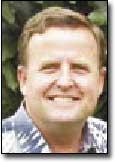State funds for widening both congested Kuhio and Kaumuali’i highways are included in the state budget, and should have remained there as the document was slated to be approved late last night, according to state Sen. Gary Hooser, D-Kaua’i-Ni’ihau. Somewhere
State funds for widening both congested Kuhio and Kaumuali’i highways are included in the state budget, and should have remained there as the document was slated to be approved late last night, according to state Sen. Gary Hooser, D-Kaua’i-Ni’ihau.
Somewhere between $15 million and $19 million should be approved for widening Kuhio Highway to four lanes from the Wailua River towards Waipouli, and millions more for widening Kaumuali’i Highway to four lanes from at least Lihu’e to Puhi, he told The Garden Island by telephone from Honolulu yesterday.
“I’m confident that will be in there,” he said of the Kuhio Highway funds, as members of both the state House and state Senate approved funds for the project in their versions of the state budgets, though the amounts differ.
State Reps. Bertha Kawakami, D-Waimea-Ni’ihau, Ezra Kanoho, D-Lihu’e-Koloa, and Mina Morita, D-Kapa’a-Hanalei, were instrumental in helping to secure the congestion-busting funds, Hooser explained.
The representatives are doing “a bang-up job,” and Kawakami is playing a “crucial role” in getting Kaua’i projects funded as vice chair of the House Finance Committee, added Hooser.
“In terms of highway funds, I would say Kaua’i is doing very well,” possibly better than any other senatorial district in the state, said Hooser, who provided updates on some other pending legislation.
In matters pertaining to the public schools, Hooser said schools should get additional operating funds through appropriations to beef up the per-student amounts of funding under the weighted-student formula being used to determine exactly how much money each school gets.
Around $160 million is planned to be used for school repair and maintenance, with a final figure scheduled to be agreed upon by lawmakers this morning, he said.
Those funds are for fixing roofs, replacing carpets and windows, and other needs, explained Hooser.
Several million dollars more will be approved for general capital improvements, such as new school libraries, classrooms, cafeterias, and new schools, he added.
“There will be a significant infusion of funds into schools,” he promised.
Emergency appropriations, for fixing up Kuhio Highway in Kilauea, inspection of dams, and other work in the aftermath of the deadly flood of March 14, should be approved, though the final amounts won’t be known until members of both the state House and state Senate meet in conference committee to determine those amounts, he said.
A non-binding resolution encouraging state Attorney General Mark Bennett to support the hiring of an independent investigator to find out the cause or causes of the Ka Loko Reservoir dam breach, has passed, and Bennett supports the resolution and its suggestion, Hooser said.
Though it probably won’t happen this year, Hooser continues to support state appropriations to keep private air-ambulance service flying between the islands, he said on another matter.
Matching funds could come from the counties, said Hooser. “Ultimately, we need to subsidize those services. We need to subsidize in order to get the kind of service we deserve,” not just on Kaua’i, but on all the Neighbor Islands, he continued.
The “tragic” crash of the Hawaii Air Ambulance craft recently brought the problem to light. “We need to move on this issue.”
While the focus has been on trauma and emergency cases, even in some of those cases patients must wait four or five hours before an air-ambulance unit can come from O’ahu to Kaua’i or one of the other Neighbor Islands, he said.
Some people wait 10 hours, or even days, for availability of the air transport in non-life-threatening cases, he said.
Hooser said he is as proud of a bill he helped defeat as some of those he helped gain passage.
The so-called Hokulia bill, named for a spot on the Big Island tabbed for development, died in the Senate Water, Land and Agriculture Committee Hooser is vice chair of, he explained.
He took the rare route of opposing a bill the committee chair (state Sen. Russell S. Kokubun, D-Kapalama-Waiakea-Volcano-Kahuku) favored, as passage would have had a detrimental impact on use of agricultural land in the state for non-agricultural purposes, he said.
“Helping to defeat that was important.”
Kanoho, who Monday had 26 bills to consider as chair of a conference committee, took some time to talk about bills of importance to him, including controversial, marine-management-area legislation proposing to close to bottom fishing some areas of the state in order to allow depleted fish populations to regenerate.
One proposal is a temporary closure, from May 1 to July 31, during spawning season of some ocean fish, while a state Department of Land and Natural Resources proposal calls for permanent closure of certain areas, Kanoho said.
Recreational and commercial fishermen have opposed the legislation.
Funds should be appropriated this session to conduct baseline studies, to see just how depleted certain fish stocks are, for creation of artificial reefs, and for other purposes, he said.
Protecting agricultural lands in the state from non-agricultural uses is important for Kanoho, too, he said.
Kanoho has announced he will not be seeking re-election, opening the way for a crowded candidate field of Kauaians seeking his House seat.


